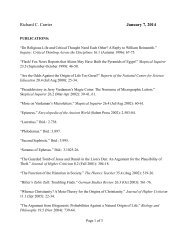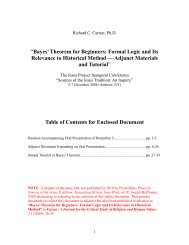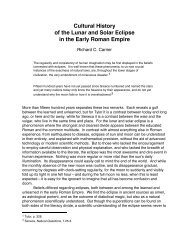Herod the Procurator - Richard Carrier
Herod the Procurator - Richard Carrier
Herod the Procurator - Richard Carrier
You also want an ePaper? Increase the reach of your titles
YUMPU automatically turns print PDFs into web optimized ePapers that Google loves.
(straton...tên epimeleian hapasan AJ 14.280), not a formal position of deputygovernorship<br />
of all Syria (that is, as an administrative province with legal jurisdiction<br />
over Roman citizens), and thus epimelêtês is probably used non-technically here.<br />
Smallwood proposes that (in <strong>the</strong> BJ) Syrias hapasês epimelêtên “is probably an error” for<br />
stratêgon Koilês Syrias (<strong>the</strong> exact words of <strong>the</strong> AJ), 73 but it seems more likely an error (or<br />
a deliberate metonymy) for tên epimeleian hapasan, since <strong>the</strong> two key words here are<br />
nearly <strong>the</strong> same and appear adjacent to eacho<strong>the</strong>r in both <strong>the</strong> BJ and <strong>the</strong> AJ. It is remotely<br />
possible that Josephus originally wrote, or intended to write, Syrias hapanta epimelêtên,<br />
“<strong>the</strong> whole caretaker of Syria,” since a scribal mistake of -anta for -ês is not only<br />
feasible, but here likely, by confusion with ei<strong>the</strong>r <strong>the</strong> proximity of Syrias or <strong>the</strong> -ês<br />
termination on <strong>the</strong> o<strong>the</strong>rwise masculine epimelêtês (and indeed taking hapanta with<br />
epimelêtên is <strong>the</strong> more difficult reading). But such an emendation is not needed, since <strong>the</strong><br />
received text can already be read as having <strong>the</strong> same meaning. Smallwood’s argument<br />
about two different positions being implied here is thus moot: Josephus is talking about a<br />
single state of affairs in both cases, not two separate offices. The term epimelêtês in <strong>the</strong><br />
BJ merely picks up <strong>the</strong> non-technical epimeleia in <strong>the</strong> AJ, as a description of <strong>the</strong><br />
consequences of making <strong>Herod</strong> <strong>the</strong> official stratêgos of Coele-Syria at that time.<br />
Thus, this does not serve as a parallel for epitropos. For epimelêtês is not a<br />
technical word for a Roman office anyway, thus leaving Josephus greater license for its<br />
use: it can describe a prefecture (AJ 18.89) or a governorship (AJ 17.6) on <strong>the</strong> one hand,<br />
or a property manager on <strong>the</strong> o<strong>the</strong>r (BJ 2.123, 129, 134), even those whom King David<br />
appointed to build <strong>the</strong> temple (AJ 7.364) or take care of city walls (AJ 7.67). And unlike<br />
this case under Cassius and Brutus, in <strong>the</strong> Augustan case both <strong>the</strong> AJ and BJ completely<br />
agree on <strong>the</strong> term used and <strong>Herod</strong>’s apparent powers. It is important to note <strong>the</strong> fact that<br />
epitropos, and its verbal cognate epitropeuô, always carry <strong>the</strong> forceful if not official<br />
connotation of taking charge, whereas epimeleia first and foremost means just “care<br />
bestowed upon, attention paid to,” an informal notion, and epimelêtês, though it can refer<br />
to military commands, often denotes a financial role (as seen above). In <strong>the</strong> same way,<br />
<strong>Herod</strong>’s vast benefaction of grain to all Judaea and neighboring territories during a<br />
famine is called an epimeleia (AJ 15.315), as is Agrippa’s appointment by Claudius to <strong>the</strong><br />
task of refurbishing <strong>the</strong> Temple (AJ 20.222), and also <strong>the</strong> Jews’ custody and care of <strong>the</strong><br />
priestly vestments (AJ 18.90). Thus, <strong>Herod</strong>’s position in Syria “as a whole” under Cassius<br />
and Brutus may have been one of controlling funds and supply lines, or providing for <strong>the</strong><br />
military defense of all of Syria from his official strategic position in only Coele-Syria.<br />
This is implied by what Josephus says in BJ 1.225, where <strong>Herod</strong>’s role in providing tas<br />
chreias (“useful things,” possibly equipment and supplies) is stated as <strong>the</strong> reason for<br />
giving him this epimeleia in <strong>the</strong> first place. He might command an army to that end, but<br />
73 Op. cit., p. 47, n. 8.<br />
24








